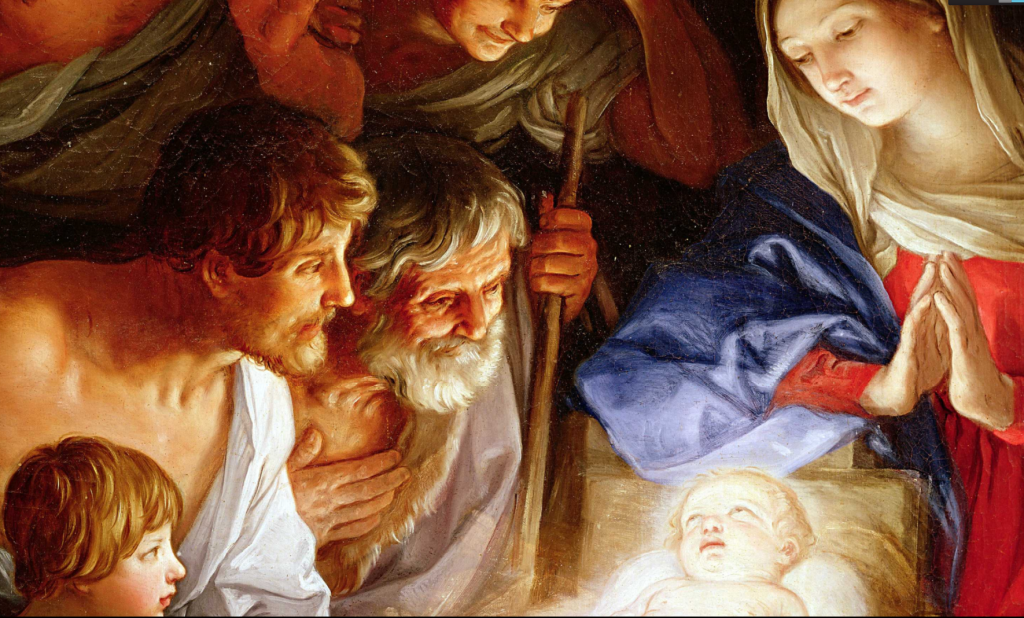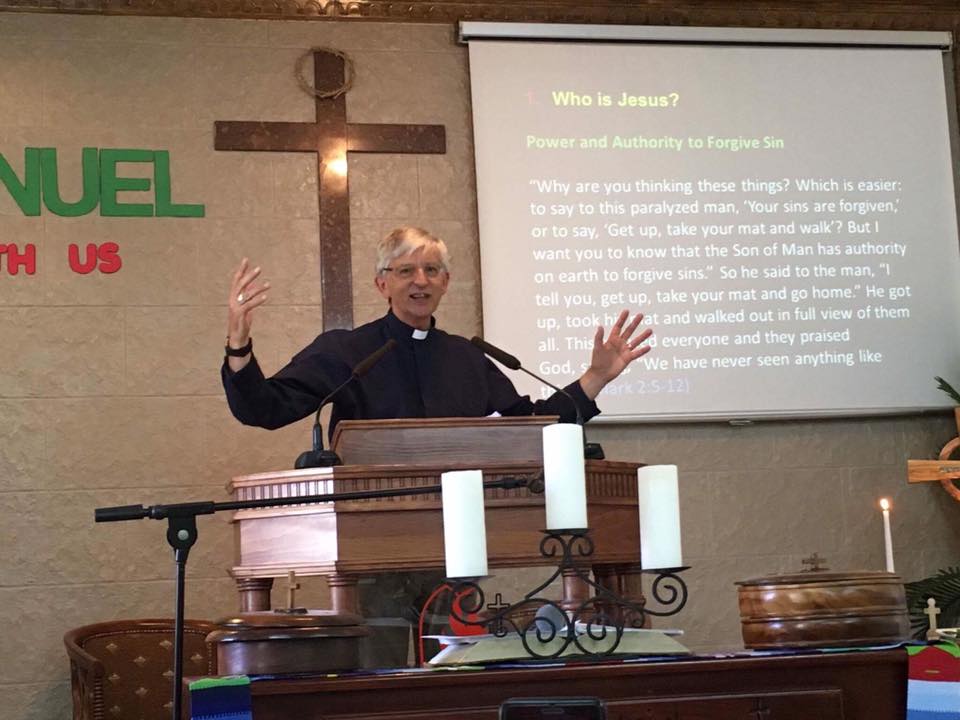Join the Peacemaker Team – Peacemakers Donation Response Form
To receive regular updates visit our website

Join the Peacemaker Team – Peacemakers Donation Response Form
To receive regular updates visit our website
 “Now the story of Christ is simply a true myth: a myth working on us in the same way as the others, but with the tremendous difference that it really happened.” — C. S. Lewis
“Now the story of Christ is simply a true myth: a myth working on us in the same way as the others, but with the tremendous difference that it really happened.” — C. S. Lewis
‘What are we to make of Jesus Christ?’ This is a question, which has, in a sense, a frantically comic side. For the real question is not what are we to make of Christ, but what is He to make of us? The picture of a fly sitting deciding what it is going to make of an elephant has comic elements about it. But perhaps the questioner meant what are we to make of Him in the sense of ‘How are we to solve the historical problem set us by the recorded sayings and acts of this Man?’ This problem is to reconcile two things. On the one hand you have got the almost generally admitted depth and sanity of His moral teaching, which is not very seriously questioned, even by those who are opposed to Christianity. In fact, I find when I am arguing with very anti-God people that they rather make a point of saying, ‘I am entirely in favour of the moral teaching of Christianity’ — and there seems to be a general agreement that in the teaching of this Man and of His immediate followers, moral truth is exhibited at its purest and best. It is not sloppy idealism; it is full of wisdom and shrewdness. The whole thing is realistic, fresh to the highest degree, the product of a sane mind. That is one phenomenon.
 When you were a child, who or what did you want to be when you grew up? As a child, I dreaded the Christmas visits to aunts and uncles. Every year they would ask me the same question: “What do you want to be when you grow up?” I hadn’t a clue. In many societies, you are expected to join the family trade or you may become an apprentice to a master craftsman. That’s how my grandfather Lewis learnt his trade. My great-grandmother paid a local carpenter to take Lewis on as a young boy and teach him carpentry skills. I still have his articles of indenture. My grandfather became his pupil, a learner. Then when he too became a master craftsman, he took on my father who became his disciple. I broke the family tradition although I’m pretty good at putting Ikea furniture together. The greatest tragedy in life is not death, but life without meaning, without purpose. Many people go through life without ever discovering God’s purpose for their lives. We are not an accident. We were created for a purpose. We were made to have meaning.
When you were a child, who or what did you want to be when you grew up? As a child, I dreaded the Christmas visits to aunts and uncles. Every year they would ask me the same question: “What do you want to be when you grow up?” I hadn’t a clue. In many societies, you are expected to join the family trade or you may become an apprentice to a master craftsman. That’s how my grandfather Lewis learnt his trade. My great-grandmother paid a local carpenter to take Lewis on as a young boy and teach him carpentry skills. I still have his articles of indenture. My grandfather became his pupil, a learner. Then when he too became a master craftsman, he took on my father who became his disciple. I broke the family tradition although I’m pretty good at putting Ikea furniture together. The greatest tragedy in life is not death, but life without meaning, without purpose. Many people go through life without ever discovering God’s purpose for their lives. We are not an accident. We were created for a purpose. We were made to have meaning.
 “When the angels had left them and gone into heaven, the shepherds said to one another, “Let’s go to Bethlehem and see this thing that has happened, which the Lord has told us about.” 16 So they hurried off and found Mary and Joseph, and the baby, who was lying in the manger.
“When the angels had left them and gone into heaven, the shepherds said to one another, “Let’s go to Bethlehem and see this thing that has happened, which the Lord has told us about.” 16 So they hurried off and found Mary and Joseph, and the baby, who was lying in the manger.
17 When they had seen him, they spread the word concerning what had been told them about this child, 18 and all who heard it were amazed at what the shepherds said to them. 19 But Mary treasured up all these things and pondered them in her heart. 20 The shepherds returned, glorifying and praising God for all the things they had heard and seen, which were just as they had been told. 21 On the eighth day, when it was time to circumcise the child, he was named Jesus, the name the angel had given him before he was conceived.” (Luke 2:15-21)
There is one word that best describes the night the Lord Jesus was born – ordinary. The sky was ordinary. An occasional gust stirred the leaves and chilled the air. The stars were like diamonds sparkling on black velvet. Fleets of clouds floated in front of the moon. It was a beautiful night – a night worth peeking out of your bedroom window to admire – but not an unusual one. No reason to expect a surprise. Nothing to keep you awake. An ordinary night with an ordinary sky. The sheep were ordinary too. Some fat. Some scrawny. Some with barrel bellies. Some with twig legs. Common animals. No fleece made of gold. No history makers. No blue-ribbon winners. They were simply sheep – sleeping silhouettes on a hillside. And the shepherds? Peasants they were. Ancestors of today’s Bedouin. Wearing all the clothes they owned. Smelling like sheep and looking just as woolly. True they were conscientious, and hardy as well, to spend every night outside guarding their flocks. But you won’t find their staffs in a museum. You won’t find their writings in a library. No one asked for their opinion on social justice or the meaning of the Torah. They were anonymous, simple, ordinary people.
 I was recently invited to give a series of lectures in a dozen or so universities across Iran and dialogued with Islamic scholars in Qom. The Q&A session after each presentation was a lively affair – longer in fact than my presentations. The most frequently asked question concerned the reliability of the Bible. What did I think about Dan Brown’s book, The Da Vinci Code? Apparently more than a billion people worldwide believe the views popularized in the Da Vinci Code.
I was recently invited to give a series of lectures in a dozen or so universities across Iran and dialogued with Islamic scholars in Qom. The Q&A session after each presentation was a lively affair – longer in fact than my presentations. The most frequently asked question concerned the reliability of the Bible. What did I think about Dan Brown’s book, The Da Vinci Code? Apparently more than a billion people worldwide believe the views popularized in the Da Vinci Code.
They believe the message of the Bible has been corrupted and distorted, that Jesus is not the Son of God, but a prophet and that he did not die on the cross or rise from the dead.
They believe that in 325AD the Emperor Constantine commissioned the writing of the New Testament we now have which portrays Jesus as a divine figure. Dozens of other “gospels” were censored or destroyed. Constantine actually summoned the Council of Nicaea to end disunity caused by the Arian controversy. Arius taught that although Jesus was the Son of God, he was less than the Father. The Council was attended by around 300 bishops. The Arian Creed was soundly rejected. The Nicene Creed was accepted by 298 Bishops. 2 were against. (i.e., over 99% in favour). The Council of Nicaea recognized Jesus as “begotten not made, of the same substance (homousios) as the Father.”
 The term Jihad tends to be associated with Islam – indeed for some, the two words are synonymous. But the fact is violent extremism is found in all religions. I could easily quote Islamic or Jewish leaders who justify the use of violence in the name of God, but I will give you one example from a well-known Christian. Following the tragedy of 9/11 and destruction of the World Trade Centre in New York, multi-bestselling author and Christian journalist Anne Coulter, wrote,
The term Jihad tends to be associated with Islam – indeed for some, the two words are synonymous. But the fact is violent extremism is found in all religions. I could easily quote Islamic or Jewish leaders who justify the use of violence in the name of God, but I will give you one example from a well-known Christian. Following the tragedy of 9/11 and destruction of the World Trade Centre in New York, multi-bestselling author and Christian journalist Anne Coulter, wrote,
“We don’t need long investigations of the forensic evidence to determine with scientific accuracy the person or persons who ordered this specific attack. We don’t need an “international coalition.” We don’t need a study on “terrorism.” … We know who the homicidal maniacs are. They are the ones cheering and dancing right now. We should invade their countries, kill their leaders and convert them to Christianity. We weren’t punctilious about locating and punishing only Hitler and his top officers. We carpet-bombed German cities; we killed civilians. That’s war. And this is war.”[1]
In my opinion, too many evangelical leaders have also been quick to endorse Mr Donald Trump’s threat to “totally destroy North Korea.” Thankfully, many Christians in the USA as well as Europe and Asia repudiate views such as these as a gross distortion of Christianity and grave insult to the teachings of Jesus the Christ.
 On my first visit to Palestine, about 25 years ago, our tour guide was a Messianic Jew called Zvi. One day, someone in the group asked him a question about the Palestinians. He was prepared. He gave each of us a piece of paper with a quote by Golda Meir,
On my first visit to Palestine, about 25 years ago, our tour guide was a Messianic Jew called Zvi. One day, someone in the group asked him a question about the Palestinians. He was prepared. He gave each of us a piece of paper with a quote by Golda Meir,
“It was not as if there was a Palestinian people in Palestine and we came and threw them out and took their country away from them. They did not exist.”
We didn’t ask any more questions until we got to Nazareth and met one of the local pastors. He gave us a short talk about why he was an Arab, a Palestinian, an Israeli and a Christian. I learnt that day that it was wiser and safer to let people self-identify and not presume to tell them who they are or are not.
Who am I? The world out there has plenty of ideas. Some would say I am who I was – the quest to trace our family tree, to know who are ancestors were can define us. My ancestors were here before yours were. Others insist I am what I achieve. What university did you go to? For others, I am what I drive. For some it is all about where I live. In a Settlement or an unregistered village? For some I am what I eat. For many I am what I do. For some I am who I love. For some I am what I know. For others I am who I know. For lots of people I am what I possess. But many people just don’t know. They are searching for meaning and purpose. They are trapped not knowing who they really are. Who am I? The Bible says, we will never know who we are until we decide who Jesus is. Because Jesus says, “I am who I follow”.
 A church not far from here was blessed with a godly minister for over thirty-five years. He was loved by the church and the community. After he retired, he was succeeded by a younger pastor. It was his first pastorate and he wanted to do his very best. He had only been at the church a few weeks when he began to perceive that the people were upset with him about something. He was troubled. Eventually he spoke to one of the leaders, “I don’t know what I may have done wrong, but I have a feeling that the congregation are not happy with me.” The man said, “Well, I hate to say it, but it’s the way you do the Communion service.” “The way I do the Communion service? What do you mean?” “Well, it’s not so much what you do as what you leave out.” “I don’t think I leave out anything from the Communion service.” “Oh yes, you do. Just before our previous rector administered the chalice and wine to the people, he’d always go over and touch the radiator. And, then, he would–” “Touch the radiator? I never heard of that liturgical tradition.” So the younger man called the former pastor for advice. He said, “I haven’t even been here a month, and I’m in trouble.” “In trouble? Why?” “Well, it’s something to do with touching the radiator. Could that be possible? Did you do that?” “Oh yes, I did… Always before I administered the chalice to the people, I touched the radiator to discharge the static electricity from the carpet so I wouldn’t shock them.”
A church not far from here was blessed with a godly minister for over thirty-five years. He was loved by the church and the community. After he retired, he was succeeded by a younger pastor. It was his first pastorate and he wanted to do his very best. He had only been at the church a few weeks when he began to perceive that the people were upset with him about something. He was troubled. Eventually he spoke to one of the leaders, “I don’t know what I may have done wrong, but I have a feeling that the congregation are not happy with me.” The man said, “Well, I hate to say it, but it’s the way you do the Communion service.” “The way I do the Communion service? What do you mean?” “Well, it’s not so much what you do as what you leave out.” “I don’t think I leave out anything from the Communion service.” “Oh yes, you do. Just before our previous rector administered the chalice and wine to the people, he’d always go over and touch the radiator. And, then, he would–” “Touch the radiator? I never heard of that liturgical tradition.” So the younger man called the former pastor for advice. He said, “I haven’t even been here a month, and I’m in trouble.” “In trouble? Why?” “Well, it’s something to do with touching the radiator. Could that be possible? Did you do that?” “Oh yes, I did… Always before I administered the chalice to the people, I touched the radiator to discharge the static electricity from the carpet so I wouldn’t shock them.”